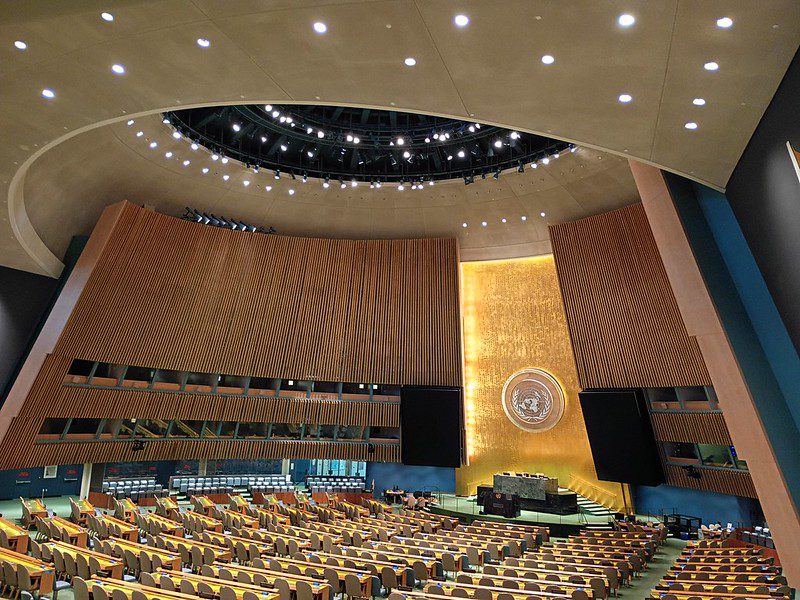At the United Nations General Assembly “high-level” week , leaders including Trump, Macron and Starmer gather in New York as debates over Ukraine and renewed calls to recognise Palestinian statehood are expected to dominate the agenda.
The 80th edition of the United Nations General Assembly (UNGA) has kicked off, running from September 2025 – September 2026. However, the focus will turn towards the high-level week of summits, speeches and meetings set to take place this week.
The week, lasting from 22nd to the 28th September will see presidents, prime ministers and foreign ministers fly from around the world to deliver speeches at the General Debate and hold high-profile side meetings.
Contentious issues are set to dominate the agenda with President Trump setting his sights on peace settlements for both the Ukraine-Russia and Israel-Palestine conflicts. Alongside this, high-stakes meetings are also expected to take place with a possibility of some of the world’s most important leaders coming together.
The General Debate commences on Tuesday, 23rd of September with at least 188 heads of state, heads of government or other high-ranking officials set to speak throughout the week.
The Israel-Palestine conflict is set to dominate the debate
The General Debate will begin two weeks ahead of the second anniversary of the October 7th attacks. It marks two years since Hamas-led militants launched a large-scale surprise attack from Gaza into Southern Israel, killing around 1,200 people, abducting 250 hostages some of whom continue to be held by Hamas. The event sparked the Israel-Hamas war and since then Israel has mounted counterstrikes and operations in Gaza, humanitarian conditions have worsened dramatically, with thousands of civilians killed and displaced. The humanitarian situation in Gaza and the UN’s recent Commission of Inquiry which advised that Israel was committing genocide in Gaza has prompted greater diplomatic pressure and renewed calls for a ceasefire.
Whilst some agreements have been reached to release hostages and the bodies of those that have been killed in captivity. Progress is still slow at reaching an overall peace agreement or a ceasefire, it has recently become more challenging after Israel launched strikes against Hamas negotiators and leadership in Doha, Qatar which sparked condemnation from Middle-Eastern countries as well as the UK and France.
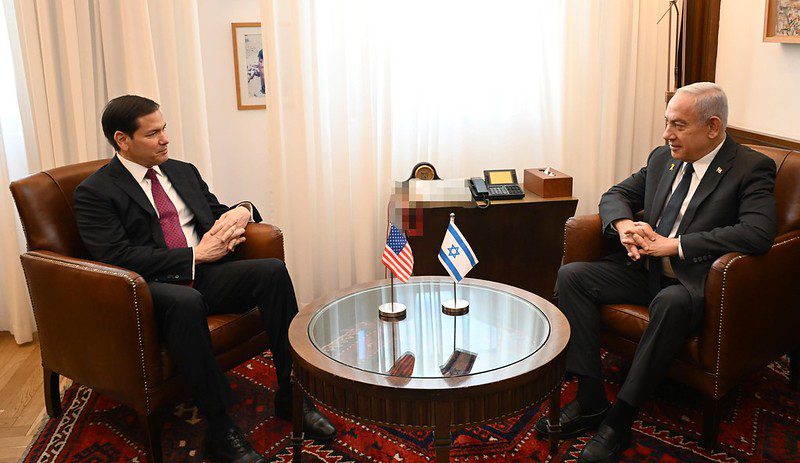
Image: US Secretary of State Marco Rubio meets with Israeli Prime Minister Benjamin Netanyahu – Prime Minister of Israel / Haim Zach
The General Debate comes as momentum builds internationally to recognise Palestinian statehood. Belgium, France and Malta had already pledged recognition earlier this summer. In a landmark shift, Australia, Canada, the UK and Portugal have now formally recognised Palestine, joining over 140 countries worldwide. Many leaders are expected to use the stage to press Israel to engage with the two-state framework, while others will continue to reaffirm solidarity with Israel.
Pressure was also amplified by the New York Declaration, the outcome of an international conference chaired by France and Saudi Arabia in July. French Ambassador Jerome Bonnafont called the declaration “a single roadmap to deliver the two-state solution”.
The agreement called for a number of key measures to deliver the solution including:
- An immediate ceasefire in Gaza
- The release of all hostages held there
- The establishment of a Palestinian state that is both viable and sovereign
- The disarmament of Hamas and its exclusion from governance in Gaza
- The normalisation of relations between Israel and collective security guarantees
However, Israeli officials were critical of the declaration with the Israeli Ambassador to the UN, Danny Danon, arguing that:
“This one-sided declaration will not be remembered as a step toward peace only as another hollow gesture that weakens this Assembly’s credibility”.
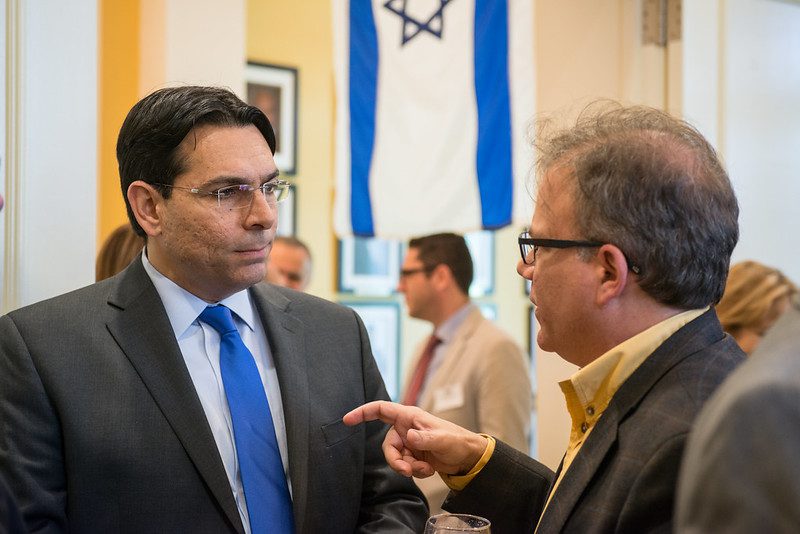
Image: UN Ambassador to Israel Danny Danon – Florida International University
Danon added “Hamas is the biggest winner of any endorsement here today” and will declare it “the fruit of 7 October”.
The vote was held ahead of the General Debate on September 12th, the UN General Assembly adopted the resolution with 142 votes in favour, 10 against and 12 abstentions.
Israel voted against the resolution alongside allies such as the United States, Argentina and Hungary. Pacific nations also voted against the resolution including Palau, Tonga, Nauru and Micronesia.
Abstention came from Albania, Cameroon, Czechia, the Democratic Republic of Congo, Ecuador, Ethiopia, Fiji, Guatemala, North Macedonia, Moldova, Samoa and South Sudan.
Whilst any progress to recognise Palestinian statehood universally is unlikely to materialise, due to the UNSC requiring a vote and a likely US veto, the debate will still be a platform that will see fiery debates from both sides on how to reach an agreement that will see all hostages released, provide a long-term pathway to peace and bring the conflict to an end.
Pressure mounts on Russia to reach an agreement on Ukraine
The summit is also set to see high-profile speeches touching on the situation in Ukraine. The conflict began with Russia’s invasion in February 2022. As of 31 July 2025, there have been 13,883 civilian deaths and 35,000 people injured, 6.9 million Ukrainians have registered as refugees living abroad highlighting the human impact of the conflict.
Over the summer and throughout 2025, efforts have ramped up to reach a peace agreement between the two countries.
In May, the first round of direct talks was held in Istanbul since early in the invasion. The talks were successful leading to agreed prisoner-of-war swaps and an agreement to continue dialogue. However, at the time no ceasefire deal was reached and fundamental disagreements regarding territorial issues, Ukraine’s sovereignty and neutrality remained unsolved.
This was followed by a second round of direct talks in Istanbul, where each side presented a roadmap for peace. Ukraine demanded a full unconditional ceasefire of at least 30 days whilst Russia included preconditions like territorial concessions and halting foreign military assistance. The gap between the two requirements illustrates that progress remains challenging.
Following a meeting between President Trump and President Putin as well as a meeting of the ‘Coalition of the Willing,’ a group who seeks to provide post-war support to secure peace, the Kremlin announced peace talks were paused. Russia accused Europe of hindering the negotiation process. The decision stalled progress to reach an agreement to end the war.
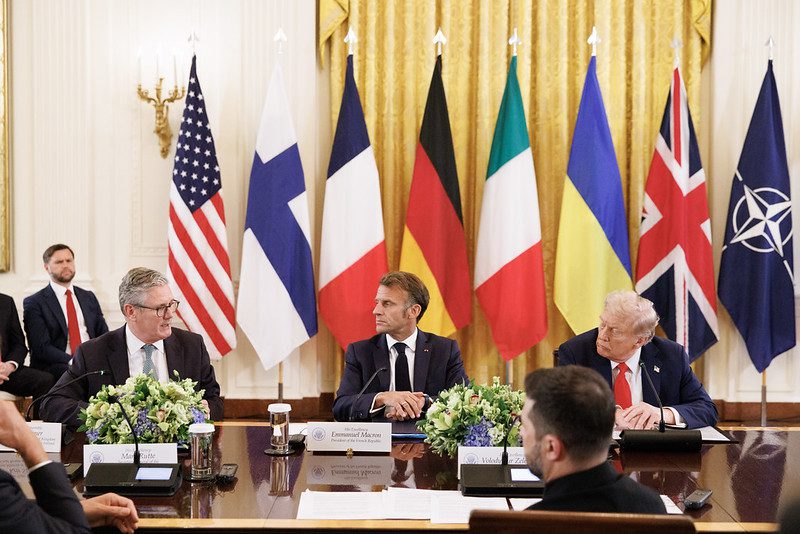
Image: Prime Minister Keir Starmer meets US President Donald Trump and President Macron – Number 10 / Simon Dawson
Whilst talks have stalled, efforts to seek peace remain strong. President Trump is seeking new measures to hinder Russia’s progress in the war, including sanctioning India for buying Russian oil and urging all European nations to stop buying oil as well.
In a recent meeting between President Trump and Prime Minister Keir Starmer, during Trump’s state visit to the UK, the US President signalled discontent with President Putin saying that he “has really let me down”.
The UN General Debate will provide a stage for both representatives of Russia and Ukraine, to put forward their arguments to reach a peace deal. It is also expected that representatives from the UK, France, EU and the US will meet along the sidelines to discuss their next steps to pave the way for peace.
Climate change lurks in the shadow of conflict
Whilst all eyes may be on how the General Debate will impact conflict, climate change is also set to be a topic of contention. Discussions will be put forward on climate finance, loss and damage and whether wealthy nations will deliver on promises to the Global South.
COP30, due to take place in Belem, Brazil, is just months away with countries most threatened by climate change set to lay the foundations for the summit at the General Debate.
The summit is hoping to see countries submit new national climate plans, known as ‘Nationally Determined Contributions’ or ‘NDCs’. The key focus will be on finance, adaptation and energy transition.
The deadline for submitting new NDCs was February 2025, however, 95 per cent of governments missed it. Since then some additional governments have submitted their plans, although key players like the EU and China have yet to do so. Brazil is hoping that governments will publish their plans by September 2025, so that a ‘stocktaking report’ can be released ahead of the COP30 summit.
Financing climate action is set to be a recurring topic. At COP29 in Baku, Azerbaijan, it was agreed that developing countries would ‘take the lead’ in mobilising USD 300 billion per year by 2035 to support climate action. In addition, ‘all actors’ would collaborate to enable finance of at least USD 1.3 trillion to flow to developing countries by the same year.
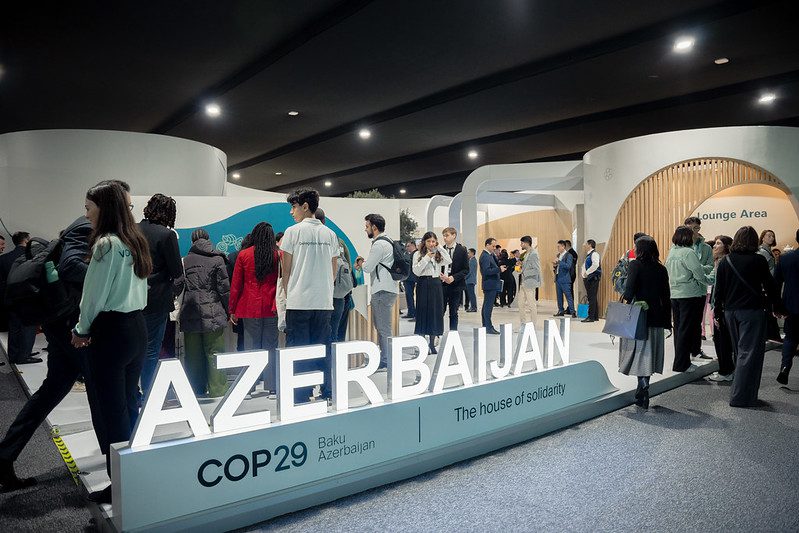
Image: COP 29 Azerbaijan – Ministério do Meio Ambiente e Mudança do Clima
Azerbaijan and Brazil have been tasked to develop a roadmap which will be released in October 2025 and be discussed at COP30.
Many developing nations and Small Island Developing States (SIDS) will likely use the platform at the General Debate to continue to call for more support to adapt and tackle climate change. Expect emotive statements and frustrated speeches as they seek to maintain countries commitments to these targets ahead of the COP30 summit in November.
Artificial Intelligence: Guterres urges global oversight
While not at the top of the agenda, artificial intelligence is expected to feature in several key UNGA discussions this year and may feature at the General Debate.
UN Secretary-General Antonio Guterres has warned that AI could deepen global inequalities and undermine trust in institutions if left unregulated. Guterres has called for “urgent international efforts” to ensure AI is developed and used responsibly, guided by human rights and ethical principles.
Last year, the Secretary-General launched a High Level Advisory Body on AI to explore global governance options. The group’s first recommendations are expected later this year and could lay the groundwork for a future UN-led framework.
Guterres has also stressed the need to include developing countries in shaping AI rules warning against a future “dominated by the interests of a few tech powers”. While the issue won’t dominate this year’s assembly, it’s gaining momentum and the UN is positioning itself as a platform for broader international cooperation on AI.
Featured Image via Paul Lowry – United Nations General Assembly

